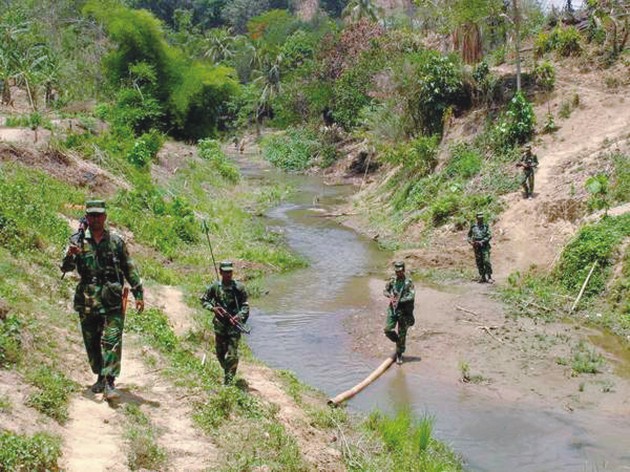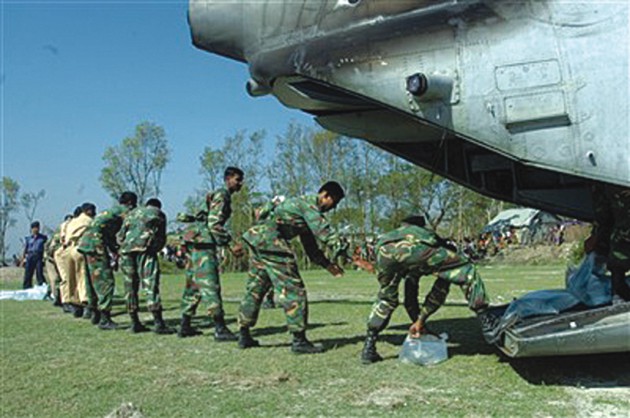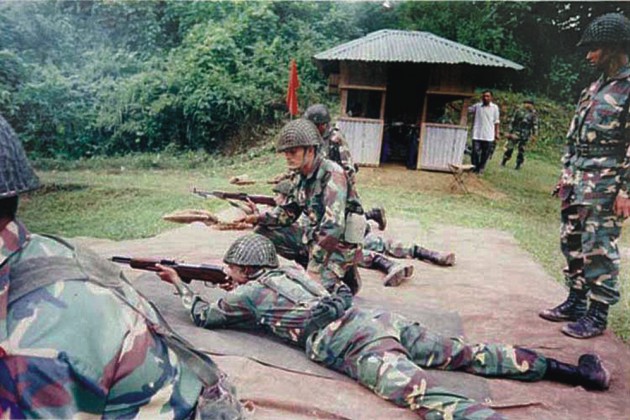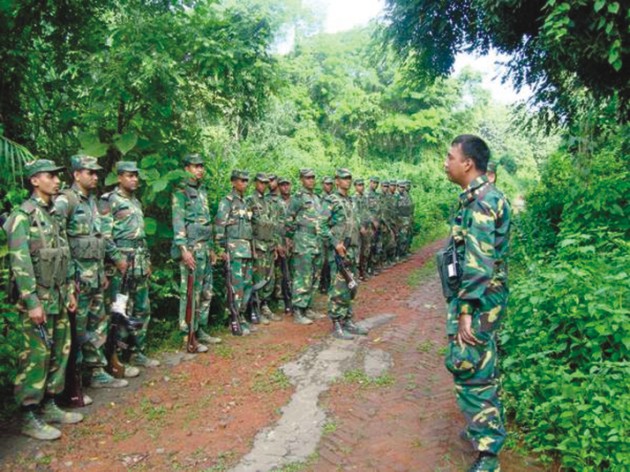
Inside
|
Two Hands are Better Than One ISHFAQ IIALHI CHOUDHURY discusses improving civil-military relations in Bangladesh
Civil-Military relations generate much debate and discussion in Bangladesh because of the ups and downs, turbulence and trepidations through which the relationship has passed over the last four decades. This debate goes on not only in Bangladesh, but also in the most developed countries of the world such as in the US, UK, and in our region in India and Pakistan. This relationship has often influenced domestic policies or its external relations, besides shaping the country's security structures. Now that we are once again consolidating our democratic polity, it is important to re-examine civil-military issues, identify shortfalls and recommend measures to build a strong, and vibrant relationship between the two important segments of the society. Before we venture further, it would be pertinent to examine the historical background. Historical background The military commanders, who operated almost autonomously during the Liberation War, had gained further confidence in themselves. To their troops, and also to large numbers of irregular Freedom Fighters (FF), or Muktis, as they were called, the Commanders appeared as demigods. The loyalty of the troops was often to the Commander as a person, and not to the organisation or the state. Added to this symbiotic relationship between men and officers who participated in the Liberation War was the induction of large numbers of officers and men repatriated from Pakistan in 1973-74. These military personnel made up the so-called "repatriated" group and generally had an acrimonious relationship with the FFs. If one is to understand what happened from August 1975 to well in the 1990s, these sub-groupings and their relationships must be taken into account. Most officers who were involved in uprisings and mutinies from 1975 to 1981 were from FF groups. However, the coup by Gen. Ershad in 1982 marked the eclipse of the FFs and the emergence of the repatriated officers in the power structure of the armed forces. From 1975 till the fall of Gen. Ershad in 1991, politicians and a large section of the civil society played second fiddle to what was trumpeted as democracy for development or grassroots democracy. The military's influential role remained even after the restoration of democ-racy in the post-Ershad era. Defence budget continued to rise, the size of the forces continued to grow and its hold in the civilian administration remained strong. From 1991 till the emergence of military-backed caretaker government in January 2008, we saw a gradual politicisation of the military, often at the cost of professional competence. With every change of political government, a number of officers were identified as too close to the previous regime and were retired, or passed over in promotion. The morale of the officers corps was thus sapped which ultimately reflected on the discipline, command and integrity of the forces. The constitutional coup by military commanders on January 11, 2008 was welcomed by a large section of the people, including the civil society. The euphoria soon died due to excesses committed by some military leaders. Instead of devoting their total energy towards holding a free and fair election, which ultimately they did on December 29 2008, they politicised themselves much to the discredit of the military institutions. There were attempts to form a National Security Council (NSC) where 3 Chiefs of the services would have permanent seats, and there was no shortage of civil society members who joined the chorus in support. Thankfully, the idea did not go too far. Excesses committed by the military intelligence, patronising obscure politicians to launch the so-called "King's Party," "the minus two formula" etc. all added to discredit a government which could have finished its tenure with a clean slate. Now that we are back in the democratic track, a well-thought out map is needed to plan the civil-military relations. While my paper will focus on how Bangladesh military can better relate to the civil society, what the civil society -- politicians, government, academics and others need to do would also come in because as they say in Bangla, Ek hate tali baje na meaning "You cannot clap with one hand." Constitutional neutrality and civilian control Democratic society is based on the principle of "civilian control of the military." This has been a hallmark of the command and control structure of the world's most powerful military, the US armed forces. The commander-in-chief of the US forces is the president, who is a civilian. Secretary of defence, equivalent to our defence minister is also a civilian. The National Security Council (NSC) is an all-civilian structure; chairman of the joint chief of staff, the senior most military officer, provides military advice when asked for. Commander of all the US forces are responsible to translate the command decision taken by the president. There are, of course, many channels to express one's opinion and even disagreement, but ventilating those in public could amount to insubordination and would call for disciplinary action. That was what happened to Gen. Macarthur in 1951 during the Korean War when his public disagreement with President Truman led to his removal from command. We recently witnessed a replay of that incident in 2010 in the case of the removal of Gen. Stanley McChrystal from Afghanistan. In India, the military stays strictly bound by its constitutional role of supporting the national government despite political turmoil and chaos, scandal and squalor. What do we need to do then? We need to start a massive education and motivational program in all military institutions about the constitutional role of the military. Our steadfast allegiance must always be to the constitution and the political masters chosen by the people. The military law in Bangladesh clearly states that while every military personnel, as citizen of the state, has the right to have his/her political opinion and has the right to vote in election, he/she cannot be member of any political party or propagate political ideology. The Military is neither a political entity nor a Trade Union. It is an institution of the government that obeys government directives. Military discipline entails that personnel at all level follow the chain of command that ultimately goes up to the president of the country. If military personnel have political ambitions, they must shed their military baggage first and then enter the political arena. Obedience to lawful command Military law reform: A long overdue task
Meanwhile, the British had further adapted and modified their laws with the changing times. British, US or Canadian military laws have been revised to provide fundamental human rights to the military personnel. In India too, many reforms have been pushed through to make military laws more humane and conform to basic human rights. For example, only last year they instituted a separate Appeal Court composed of High Court judges that would hear the appeal to the verdicts of the Court Martial. In Bangladesh, the Chief of the services who orders the court martial also confirms the findings and sentences. He is virtually the prosecutor and the judge. The accused cannot appeal against the verdict of the Court Martial. Government and the services headquarters must work together to bring about change. The power of the president "to retire any officer any time without assigning any reason whatsoever" is another legacy of the British crown. In the past this was rarely used, but nowadays it has been an easy way to deal with someone who does not tow the line. Thus, officers with integrity who stand up to question incompetence, corruption or irregularities run the risk of being retired without any notice. The wise ones, therefore, concur, much to the detriment of the service as well as the nation. According to the law, this power is a prerogative of the sovereign, but here too "justice and fair play" must prevail. However as we have recently seen the cases of large number of officers who were prematurely retired by the previous regime were reviewed and in many cases their services were restored and they were retired with higher ranks. This proves the point that this provision was misused, and as long as it remains it might be misused again. In 1996, the then Awami League government asked the service headquarters about the military laws that need to be revised or repealed. To the disappointment of many, the then service chiefs decided that nothing needed to change and the government was informed accordingly. Little did they realise that Damocles' Sword of compulsory retirement would soon descend on them too. Transparency and accountability Around the world, defence procurement had been a major source of corruption. The American Department of Commerce reports that half of all bribes paid in international business relate to arms deals, even though arms make up less than 1% of all trade. In Western democracies there are lively debates in the press, TV, academia and, of course, in the Parliament on the defence strategy, employment policy, force structure, and equipment procurement. Even in India, defence issues are open to public debate and scrutiny. Unfortunately, in Bangladesh, we are lagging behind them. It is in the interest of the defence forces that they and the government need to open up more. Although since 1992, there has been gradual progress, yet we should have done better. Our Parliamentary Committee on Defence needs to be more vigorous in their pursuit to ensure that the taxpayers' money is giving us the best defence and security environment. In this context, US Congressional Committee on Armed Services could be a guide. Those sessions are telecasted live and Generals and Admirals are often subjected to intense grilling when summoned. Reducing the military-civilian gap
In Bangladesh, unlike in the US or UK, the military tends to stay isolated from the civilian population. Whereas in the West local populace welcome military installation because it creates jobs and boosts economy, in Bangladesh we have sometimes acrimonious relationships with our civilian neighbours. In the US or UK, a local mayor or other public figures is often the guest of honour in sports or dinners; we do not see that here. It is in the interest of the military that we create advocacy groups among our intelligentsia, academia, industrial entrepreneurs who would speak for the military in the national forums. BIISS, BEI etc. are some such organisations where the two could meet, but we need far greater exposure. Bangladesh National Cadet Corps (BNCC) could be a powerful tool not only to inculcate discipline and a sense of duty in our youth, it could build up a positive image of the military in their mind. Students, for example, could be taken on study tours to military establishments. Not only some could be inspired to join, many more would think positively about military. Some of the positive steps taken by the military in closing the civil-military gap need to be mentioned. Cadet colleges and a large number of good schools in military cantonments provide quality education to numerous students of civilian parentage. Military Institute of Science and Technology (MIST) and Armed Forces Medical College (AFMC) again admit a large number of students who join the civilian world as trained professionals. We could have more military-run technical and vocational schools to meet the increasing need of quality technical manpower in the country. High-ranking bureaucrats are already being trained in the National Defence College (NDC); similarly, military officers regularly attend courses in Public Administration Training Centre(PATC). Recently, NDC started a short course designed for very senior people such as MPs, Judges, politicians, media personalities etc. The response was very encouraging. One hopes these steps are further encouraged and the tie between the civil and military continues to strengthen.
Ethno-religious structure of our military appears to be overwhelmingly Bengali Muslim male dominated. It was a bold decision by the past Awami League government to take in females in the officer cadre. Since then, a large number of female officers have graduated through the training academies and are serving in different branches. However, the discrimination continues. For example, there is no reason why female candidates cannot be taken as pilots, whereas there are hundreds of female pilots in all the modern air forces, including in India and Pakistan. These discriminations need to be abolished. We need to move the process of female induction forward by recruiting females in the other ranks too. If we can have females in Police or RAB, we can certainly have them in the BDR or military. In order to be truly national institution we also need to increase intake of religious and ethnic minorities and indigenous people in all branches of the forces and espe-cially in the officer cadre. There must also be institutions within the military that caters to the religious and cultural needs of the minorities. At this time we do not have any. In the field of upholding basic human rights the responsibility on the military is greater than ever before. While deployed in aid to civil power, the military, in the past, had been accused of violation of human rights that has tarnished the image of a disciplined force. I am reminded of the "Operation Clean Heart" where too many custodial deaths were passed of as cases of "heart attack." Such violations happened during the last caretaker government too. At a time when our forces are deployed around the world to defend human rights, how can we be accused of violating it at home? This is an area that the military high command needs to look into. Reducing the military-media gap Realising the importance of media, in the US military all commanders have professional media advisors. In fact, it is an important professional appointment that goes from field formations all the way to the Pentagon. What we have in the form of ISPR is nothing but an awfully undertrained and understaffed organisation that only dishes out press release that no one believes. This organisation needs to be built up as a truly professional body that would keep the media on the side of the military. The leading English language newspaper "The Daily Star" runs a weekly page on Strategic Issues that focuses on many military issues and helps educate people on military matters. This is a step in the right directions. Other newspapers, TV channels etc. could start their own pages or shows. On this issue, both sides military and the media, have important role to play. Conclusion A strictly apolitical military institution that represents popular aspirations acts as a pillar of democracy rather than a threat to it. In Bangladesh, we have responsibilities at all levels political leadership, bureaucracy, civil society, media and the general public, to build up a strong, institutionalised military that would face new security challenges of the 21st Century. Our military, in its peacekeeping missions, acts as the ambassador of Bangladesh and a harbinger of peace and happiness around the world. At home too, the military is a national institution, it should not be a coercive force, but should be the defender of democratic principles. With that hope I end. Air Cdre (Retd) Ishfaq Ilahi Choudhury is a Security Analyst and Registrar, BRAC University. |



